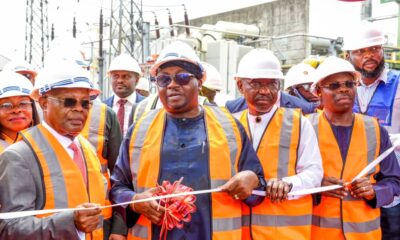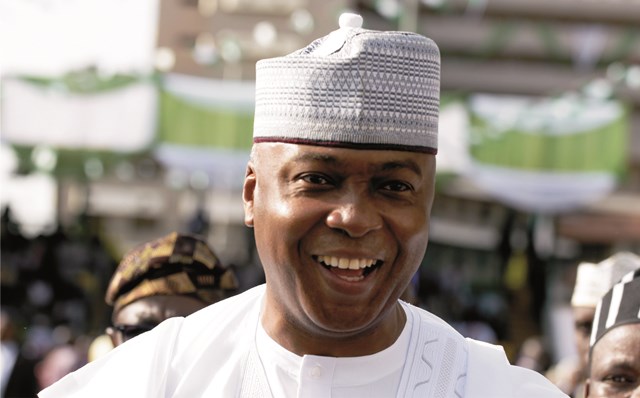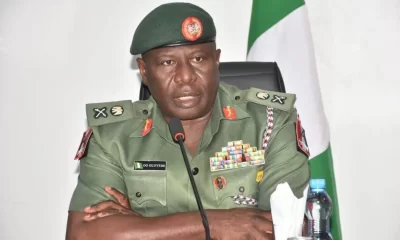Maritime
Farinto Identifies Barriers To Intra-African Trade

Former Acting National President of the Association of Nigerian Licensed Customs Agents (ANLCA), Kayode Farinto, has identified concealment of information as one of the stumbling blocks to the successful implementation of the Africa Continental Free Trade Area (AfCFTA) in Nigeria.
Farinto stated this in a paper titled, “AfCFTA: Dismantling Trade Barriers, Navigating Regional Trade”, which he delivered at the 2024 MARAN Annual Maritime Lecture, MAMAL, held in Lagos on Thursday, said pretending that all was well when it was not true would be the greatest undoing to Nigeria as country in maximizing the benefits inherent in the continent-wide trade.
According to him, “Nobody expected a hitch-free take off but we should stop pretending and deceiving all Nigerians as if all is well. We are all aware of the controversy surrounding the first shipment under AfCFTA where, according to Mr. Segun Olutayo, leaders of the AfCFTA Coordination Office in Nigeria endeavoured to window-dress this controversy by saying that receiving Certificate of Origin under AfCFTA is only a preliminary step akin to a starting point and does not necessarily indicate that a shipment has been made.
“It’s high time we stopped this our attitude where we conceal and distort real information to confuse and convince Nigerians that all is well when we know that with speaking out, people can profer solutions to whatever problem that arises.
“Giving out accurate information is one of the factors that can make AfCFTA a success (through information management).
“Concealing information from the public is not part of good information management and it runs negatively against the Freedom of Information Act. There’s nothing wrong with confirming to stakeholders when issues go wrong. All that is needed is allay their fears that whatsoever that is wrong can be corrected”.
He stated that if the Africa Continental Free Trade Area must succeed, the Nigeria Customs Service (NCS) must play a pivotal role in this, adding that one of the things that must be done was to ensure that trade was facilitated.
He said, “I watched with keen interest, Nigeria’s participation in the Biachara Africa 2024 Summit in Kigali where Nigeria businesses showcased their offering and was also delighted to hear a commital statement from the Comptroller General of Customs of the NCS, promising to ensure that trade facilitation becomes the focal point of the Service going forward, which has obviously been downplayed before now.
“It is not out of place for NCS to roll out her Standard Operating Procedure, SOP for AfCFTA.
“However, I am glad to inform this gathering that the NCS, for once, seems serious about facilitating good trade. I rely on a recent circular released to her officers to ensure that issues of alerts are not only streamlined but its incessant be addressed where every Deputy Comptrollers in charge of revenue has been given a marching order to ensure compliance by their officers.
“What is only needed to be added is sanctions for non-conformists. If this is achieved, the major monster that can kill the Africa Continental Free Trade Area agreement has been successfully eliminated”.
Insisting that the Nigeria’s maritime sector had not fared well in logistics management, he blamed it on the nation’s inability to embrace multi-modal transport system, noting that Nigeria’s reliance on road sector alone was a stumbling block and a barrier to free flow of trade.
“The Ministry of Marine and Blue Economy needs to liaise with the Ministry of Trade either on a Private Party Agreement (PPA) or taking it as her core responsibility to ensure that our over reliance on road is stopped.
“There is need for rail connectivity between the hinterland and our ports. Barge operation should be employed to reduce the congestion and traffic on road and to save time for the success of the Africa Continental Free Trade Area Agreement”, he said.
Noting that non-tariff barriers including technical barriers were very many in Nigeria, Farinto said virtually all federal government regulatory agencies had one fine or levy which he said was killing trade.
“Take for example, a regulated item by either SON or NAFDAC must pay many levies or taxes such as import permit, MANCAP, money for examination to be conducted, fees to be paid before labelling rights are granted”, Farinto said.
Earlier in his welcome address, the President of the Maritime Reporters’ Association of Nigeria (MARAN), Mr. Godfrey Bivbere, who acknowledged that AfCFTA represented a groundbreaking initiative by the African Union, designed to create a single market for goods and services, promote free movement across borders and unlock the immense economic potential of the continent, however, identified barriers such as inadequate infrastructure, regulatory bottlenecks and operational inefficiencies as hampering the seamless flow of goods across the continent.
He, therefore, said for Nigeria to maximize the benefits of AfCFTA, it must address critical requirements including: Improved Trade Infrastructure -Enhanced Roads, Transit Trailer Parks, and functional scanning facilities at ports; Efficient Procedures – Compliance with Rules of Origin (RoO) and streamlined export processes as well as Capacity Building – Training Customs officers and other stakeholders to align with AfCFTA protocols.
Others, according to him, include investment in maritime assets: “with intra-African freight expected to increase by 28% and maritime demand by 62%, we need significant investments, including the addition of 100 vessels to facilitate transport as well as Leveraging Technology and Innovation to Facilitate Trade.
“As laudable as AfCFTA is, some persons in Nigeria are worried that our lack of infrastructure (mainly energy and road) and inconsistent policy will continue to affect our production level.
“They are concerned that as a result of our low production capacity, our initial gain of shipment outside the country may fizzle out when other African countries with better production environment begin the shipment of their goods, while Nigeria may end up becoming a dumping ground”.
By: Stories by Nkpemenyie Mcdominic, Lagos
Maritime
Twenty-Four-Hour Port Operations Achievable, If -Nweke

The former President of the Nigeria Association of Government Approved Freight Forwarders (NAGAFF), Dr. Eugene Nweke, has said that only a political will would make the 24-hour port operations achievable.
Nweke made the disclosure during the Fifth Town Hall meeting organised by JournalNG held in Lagos on Thursday.
“24 hour port operations is achievable if government would give a clear order to the effect.
“Government should get a regulatory agency to supervise port operations accurately for monitoring and evaluation.
“Once everyone knows what to do, operators will be guided. It will not be a situation where government issues port order without monitoring and no enforcement.
“So, we need a political will to drive our ports for 24-hour port operations in Nigeria”, Nweke said.
He said government agencies should see the transformation as a necessity, same as port stakeholders.
Nweke continued that collaboration and partnership among stakeholders would enable both government and port users achieve 24-hour port operations.
He said any identified bottlenecks delaying the achievement of 24 hours ports operations should be removed and sanctioned accordingly.
He noted that port communities are meant for commercial activities, adding that necessary infrastructure should be considered in the ports to avoid unnecessary human element.
Nweke urged government to improve on infrastructure to make the ports more attractive and friendly for customers.
Also in his presentation, the Chairman, Nigeria Ports Consultative Council (NPCC), Mr. Bolaji Sunmola, said quest to actualise 24-hour port operations in Nigerian seaports was no longer aspirational but necessary.
He said with a carefully sequenced strategy anchored on technology, sustainability, and stakeholder alignment, Nigerian ports could be positioned as efficient, secure, and economically transformative assets.
As Chairman of NPCC, he reaffirmed commitment to this vision by inviting all stakeholders-MDAS, port terminal operators, energy providers, transport unions, and investors to join in executing this transformation.
The Assistant Comptroller, Nigeria Customs Service (NSC), Abass Oladepo, said Customs had been operating 24 hours port operations.
He said at Ports and Terminal Multi Services Ltd. (PTML) command the Customs had commenced 2-hour cargo clearance, adding that averagely in one-year the Command had achieved less than 6-hour ports clearance.
The town hall meeting was to sensitise stakeholders on Customs transformation known as B’Odogwu and urge importers to engage in honest declaration to enable them achieve few minutes cargo clearance.
In his contribution, the Managing Director, ENL Consortium, one of the terminal operators, Mr. Mark Walsh, urged Nigeria banks attached to ports cargo clearance operations to improve their operation to avoid delays in payments.
He commended the Federal Government and the Nigerian Ports Authority for modernising the ports, adding that there was need for 24-hour lighting at the ports, to stop them from running generators 24/7.
He noted that ports operation needs more lighting, especially for security during the night operations.
The General Manager, Trade Modernisation Project (TMP), Mr. Ahmed Ogunsola, urged stakeholders to collaborate and point out challenges hampering 24 hour port operations to provide solutions.
Ogunsola said TMP worked with the NCS to enhance cargo clearance by providing technology backbone, building capacity and to enhance sustainability.
He said 24 hour port operations was achievable with the collaboration of port users.
“The TMP had agreement with the Federal Government to provide 67 scanners and presently we have successfully brought five scanners into the country to modernise Nigeria Customs Service and facilitate trade”, Ogunsola said.
In his opening remarks, the Publisher, JournalNG magazine, Mr. Ismail Aniemu, said the forum gave the stakeholders opportunity to interact and come with recommendations to guide government in policy making.
Aniemu said many ports in Nigeria need to turn to smart ports, adding that Nigeria had competent expertise that would assist government to actualise the dream.
He said some of the port users were operating 24 hours and there was need fornit to be sustained collectively.
Maritime
Rice Smuggling Still Increasing In Creeks – RMIDN

Local rice merchants, under the aegis of Rice Millers, Importers and Distributors of Nigeria (RMIDN) have expressed displeasure over the upsurge in the smuggling of rice into the country through neighbouring Cotonou, Benin Republic.
According to RMIDN, Nigeria has lost an estimated N60 billion as a result of rice smuggling.
“Mostly Indian and Thailand rice that are imported into Cotonou find their way into Nigeria illegally with Western Creeks serving as gateway to the highest degree of these illicit imports”, RMIDN said.
Speaking exclusively with The Tide in Lagos, the Chief Executive Officer, Bayuf Farm limited, Chief Kabiru Idowu, noted the large scale concealment in trucks purportedly laden with dutiable goods to the fleet of vehicles under the cover of darkness, saying “Western Marine Creeks, is indeed a place to watch, if the economy of the nation must be protected”.
According to him, “the volume of imports for which revenue is lost on the part of the government may far outweigh the generated revenue and create an adverse affect on government policy to encourage local production of some products.
“It would also be recalled that in December, 2024, the Customs Area Controller, Federal Operations Unit, Compt. Kola Oladeji, disclosed to journalists at a briefing in the Command that smuggling of rice through the Western Creeks is on the increase, thereby placing a question mark on the proficiency of the Marine Command of the Customs.
According to him, the areas of water which flows into the land accounts for a higher degree of rice smuggling, adding that there is inlet through water behind Alaba market where smugglers are coming, with various items but with rice topping the lists.
Also, Mr. Tapenu Michael noted that importers of Nigeria bound goods through the Cotonou Port see the western waterways as most viable entry point either for evasion or concealment of prohibited items.
He emphasized that most items that fall under Federal Government import prohibition list or statutory barred from entering the country through land borders find their ways through the creeks.
Maritime
Truckers Raise Alarm Over NPA’s Call-Up System

The Nigerian Association of Road Transport Owners (NARTO) has issued an urgent call to the Nigerian Ports Authority (NPA) management and handlers of the eto electronic call-up system, urging immediate action to address what they describe as unfriendly policies hampering the direct delivery of cargo from the Lagos Port.
According to the Chairman of NARTO Metropolitan Unit, Abdullahi Moh’d Inuwa, the new policies under the eto call-up system have led to significant delays in truck approvals and discouraged truck operators from servicing the port.
“Direct delivery of cargo requires between 48 to 54 trucks daily per vessel, and with multiple vessels, at least 120 to 150 trucks are needed.
“However, the current approval process is slow, and many truckers now prefer loading outside the port due to the multiple levies and restrictions imposed”, Inuwa stated.
He warned that these developments threaten the business interests of consignees and importers, with many considering diverting cargo to other ports.
“Trucks are being forced to offload inside sheds, incurring extra charges and demurrage, which are eventually passed on to end users. Despite government efforts to reduce duties on agricultural products, the call-up process remains a major bottleneck”, he added.
The trucker said prompt intervention is crucial to restore confidence and ensure the smooth evacuation of cargo, which is vital for Nigeria’s import-dependent economy.
Truckers and port users have repeatedly complained about extortion by security agencies, racketeering in the call-up system, and policy inconsistencies that have resulted in gridlock, delays, and financial losses.
Industry sources confirm that the current system often favors certain operators, leaving others stranded and forcing importers to pay exorbitant fees to favours revalidate delivery orders.
NARTO is calling for a review of the eto call-up system to ensure fairness and efficiency, warning that continued inefficiencies could lead to further congestion, trade disruptions, and a shift of cargo traffic away from Apapa Port.
The association also appealed to security agencies to stop the harassment and extortion of truck drivers, and urged the NPA to harmonize safety requirements to avoid multiple taxation.
By: Stories by Nkpemenyie Mcdominic, Lagos
-
Rivers3 days ago
LG Administrator Commits To Completing Ongoing Projecrs … Urges Students Of The LGA To Be Focused
-

 Featured3 days ago
Featured3 days agoTinubu Commissions Afam 11 Power Plant …Urges Stronger Private Sector Partnership In Power Sector
-
News3 days ago
Former Petroleum Minister, Jibrin Aminu, Dies At 85
-

 Politics3 days ago
Politics3 days agoMore Members To Leave PDP – Saraki
-
Sports3 days ago
RSFCA Organises Refresher Seminar For Coaches
-

 Politics3 days ago
Politics3 days ago2027: ADC Begins Nationwide Consultation On Coalition
-
Opinion3 days ago
Managing Eco-Space Of Terrorism In Nigeria
-

 News3 days ago
News3 days agoCOAS Supports Early Voting Bill For Military, Security Personnel

